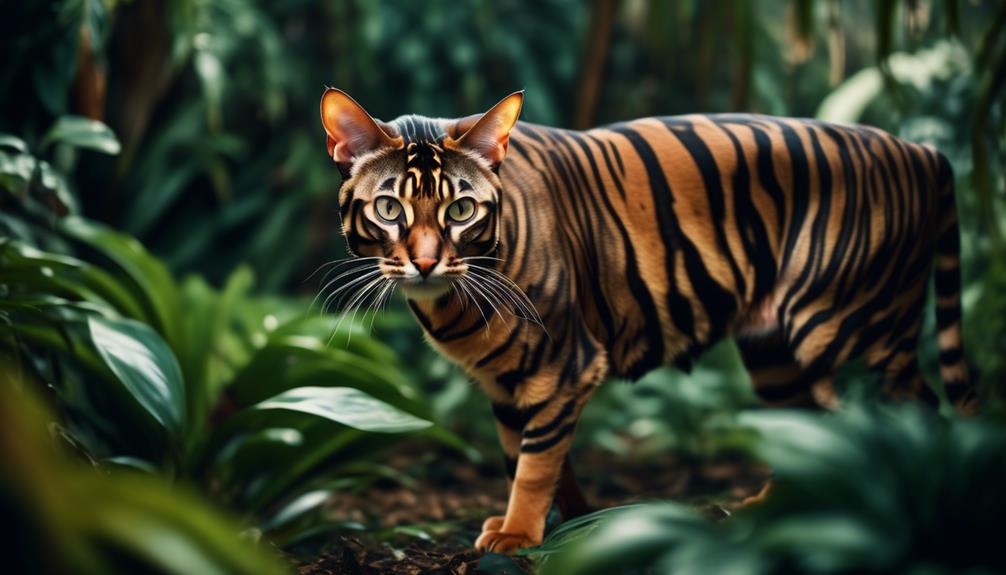
The allure of the Toyger cat breed lies in its striking resemblance to the regal tiger and its captivating personality.
As we embark on a journey to uncover the unique characteristics and traits of these feline companions, we will explore their origin, size, and appearance and delve into their health and care needs.
But the Toyger’s physical attributes and interactions with humans and other pets make it genuinely fascinating.
So, if you’re curious to discover how this breed can bring joy and delight into your life, join us as we unravel the mysteries of the Toyger cat.
Key Takeaways
- The Toyger is a medium-sized domestic shorthair cat breed that resembles a miniature tiger with short, dense, tabby-patterned fur.
- Toygers are generally healthy cats but may be prone to obesity and cardiac issues, requiring a balanced diet, exercise, and regular veterinary check-ups.
- Toygers are affectionate and playful cats that thrive in a busy household, forming strong bonds with their human family members, including children.
- When adopting a Toyger, prioritize rescue organizations or reputable breeders that prioritize health temperament and may contribute to tiger conservation efforts.
Origin and Development
The Toyger cat breed originated in the United States and was developed in the 1980s by Lady Sugden.
Lady Sugden aimed to create a domestic cat that resembled a miniature tiger.
She combined Bengal and Domestic Shorthair cats in the development process, with the involvement of a street cat from Kashmir.
The International Cat Association (TICA) officially registered the breed in 1993. The name ‘Toyger’ combines ‘toy’ and ‘tiger,’ reflecting the breed’s goal of capturing the wild tiger’s appearance.
Through careful selection and breeding, Toygers now possess a distinctive short, dense, and tabby-patterned coat that resembles a tiger’s stripes.
This breed has gained popularity due to its striking appearance and unique resemblance to a wild tiger.
See another cat breed profile.
Turkish Angora
Size and Lifespan
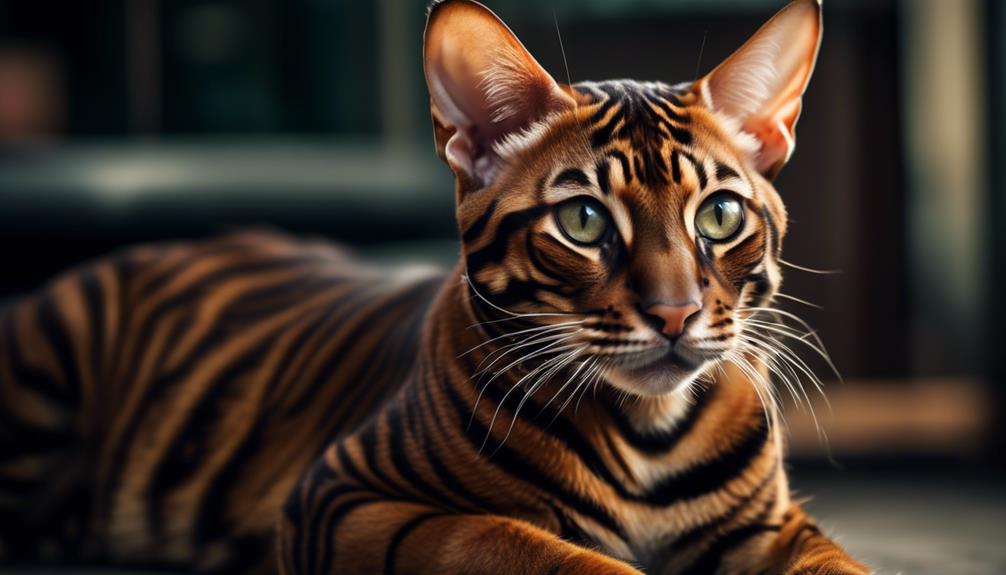
After its development in the 1980s, the Toyger cat breed has captivated cat lovers with its unique resemblance to a wild tiger, and now it’s time to explore its size and lifespan.
- Size:
- Medium-sized cat
- Male Toygers weigh 10-15 pounds
- Female Toygers weigh 7-10 pounds
- Lifespan:
- Toygers have a lifespan of 12-15 years
The Toyger is a medium-sized cat, with males weighing 10-15 pounds and females weighing 7-10 pounds. Despite their small size, they have a striking appearance, resembling a miniature tiger.
As for their lifespan, Toygers typically live for 12-15 years. It is important to note that individual lifespan may vary depending on various factors such as genetics, diet, and overall care.
Toyger owners should ensure proper nutrition, regular veterinary check-ups, and a stimulating environment to promote a long and healthy life for their beloved feline companions.
Coat and Appearance
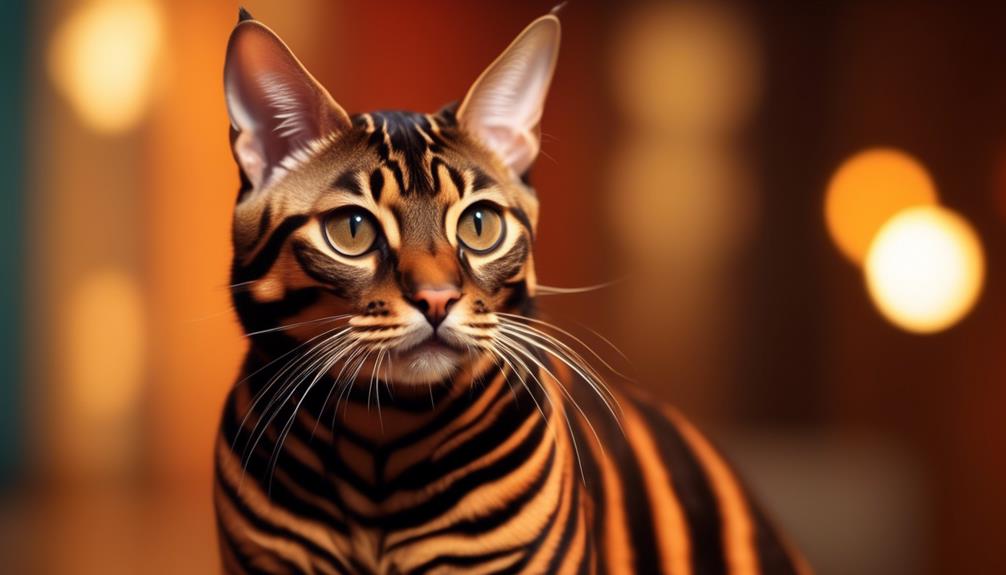
With its distinctive coat and striking appearance, the Toyger cat breed is known for its resemblance to a miniature tiger.
The coat of a Toyger is short, dense, and tabby-patterned, closely resembling a tiger’s stripes.
This unique coat pattern is achieved through careful breeding and selection, combining the characteristics of a Bengal and a Domestic Shorthair.
The Toyger’s coat can come in various colors, including brown, black, and silver.
In addition to their coat pattern, toygers have muscular and athletic bodies with long, flexible tails.
Their overall appearance exudes strength and elegance, making them a visually captivating breed.
Toygers are indeed a remarkable breed, capturing the essence of a wild tiger in a small domesticated feline.
Name and Meaning
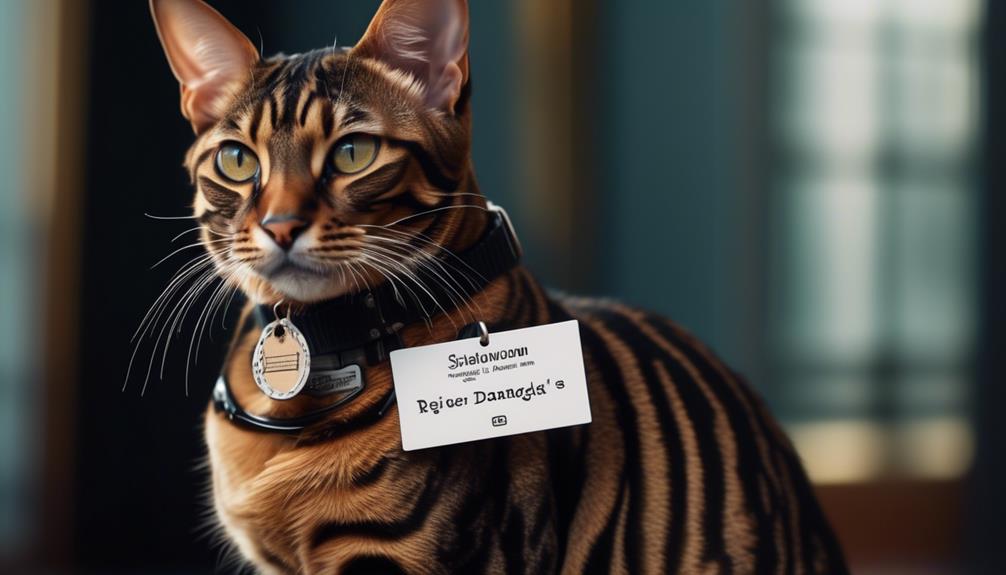
Derived from a combination of the words ‘toy’ and ‘tiger,’ the name Toyger reflects this remarkable cat breed’s unique and captivating nature.
The name holds deeper meanings, enhancing its appeal to cat lovers and enthusiasts.
Here are three sub-lists that convey a deeper meaning behind the name:
- Toy: Emphasizes the playful and mischievous nature of the Toyger breed, highlighting their love for interactive toys and games.
- Tiger: Represents the breed’s striking resemblance to wild tigers, with their bold tabby patterns and muscular build, evoking a sense of power and majesty.
- Combination: By combining the words ‘toy’ and ‘tiger,’ the name Toyger also signifies the breed’s ability to bring the essence of the wild into a domestic setting, allowing cat owners to experience the beauty of a tiger in a smaller and more manageable size.
Breed Group and Registration
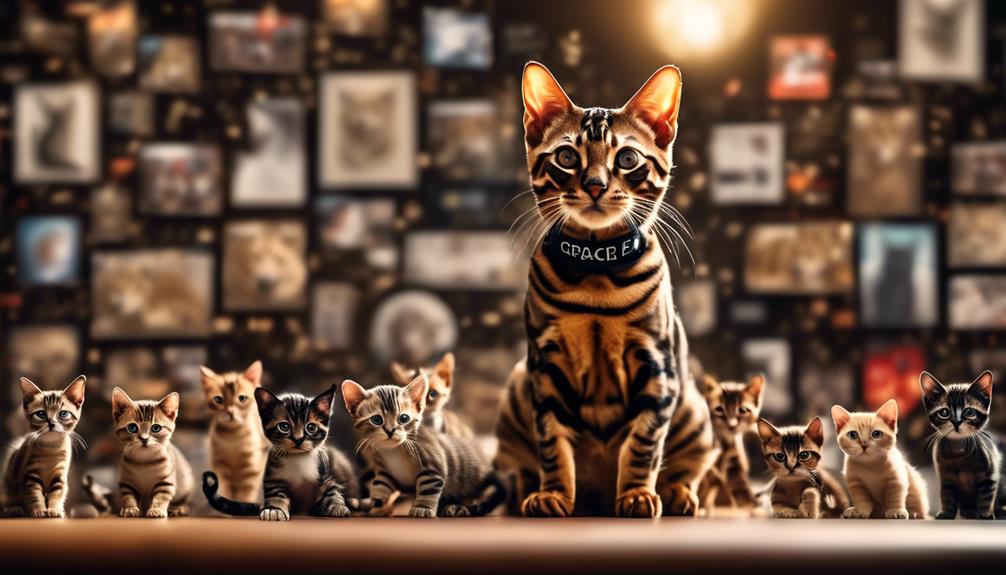
The Toyger cat breed, with its unique name and captivating characteristics, belongs to the Domestic Shorthair breed group and is officially registered by TICA.
As a member of the Domestic Shorthair breed group, the Toyger shares its classification with various other domesticated cats with short hair.
This breed group includes cats with diverse appearances and temperaments, but they all share the common trait of having short coats.
The Toyger’s registration with TICA officially recognizes its breed status and ensures that breeders adhere to specific standards and guidelines when breeding these cats.
Being registered by TICA also allows Toygers to participate in cat shows and competitions, where they can showcase their distinctive tiger-like appearance and charm.
Toyger Characteristics
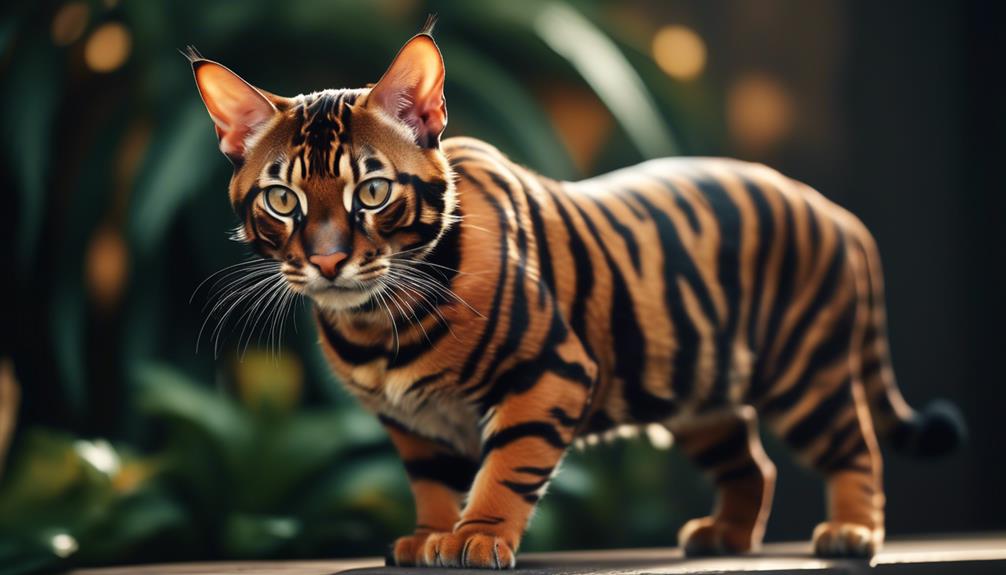
The Toyger is a medium-sized cat breed known for its distinctive tiger-like appearance and captivating characteristics. When it comes to their characteristics, there are a few key points to note:
- Size: Toygers are medium-sized cats, with males typically weighing 10-15 pounds and females weighing 7-10 pounds.
- Affectionate with Family: Toygers are known for loving and caring towards their human family members.
- Potential for Playfulness: These cats have a playful side and enjoy interactive playtime with their owners.
- Tendency to Vocalize: Toygers communicate with their owners through various sounds.
These characteristics make Toygers a delightful addition to any household, as they bring love and entertainment to their human companions.
Affection and Playfulness
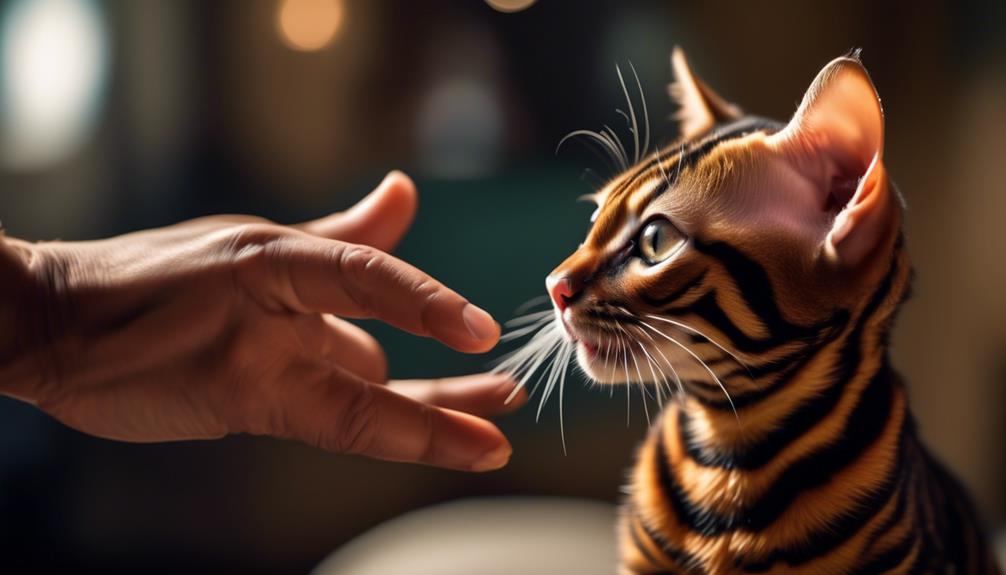
Their loving and playful nature makes Toygers a delightful addition to any household.
These cats are known for their affectionate personality and enjoy cuddling and snuggling with their human companions.
They thrive in busy households and are social cats that enjoy human company. Toygers are also intelligent and trainable, making them great companions for interactive games and outdoor adventures.
They form strong bonds with children and are usually OK with other household pets.
However, early socialization and setting boundaries are important for their interactions with humans and animals. Toygers reward good behavior and adhere to proper training regimens.
Overall, their affection and playfulness make them perfect for families looking for a loving and interactive feline companion.
| Affection and Playfulness | |
|---|---|
| Loving Nature | Toygers are affectionate cats that enjoy cuddling and snuggling with their human companions. |
| Social Cats | They thrive in a busy household and enjoy the company of humans, forming strong bonds with their family members. |
| Smart and Trainable | Toygers are intelligent and can be trained to play games and enjoy outdoor adventures. |
| Compatibility with Children and Pets | They are a great match with kids and are usually OK with other household pets, but early socialization is important. |
Vocalization Tendencies
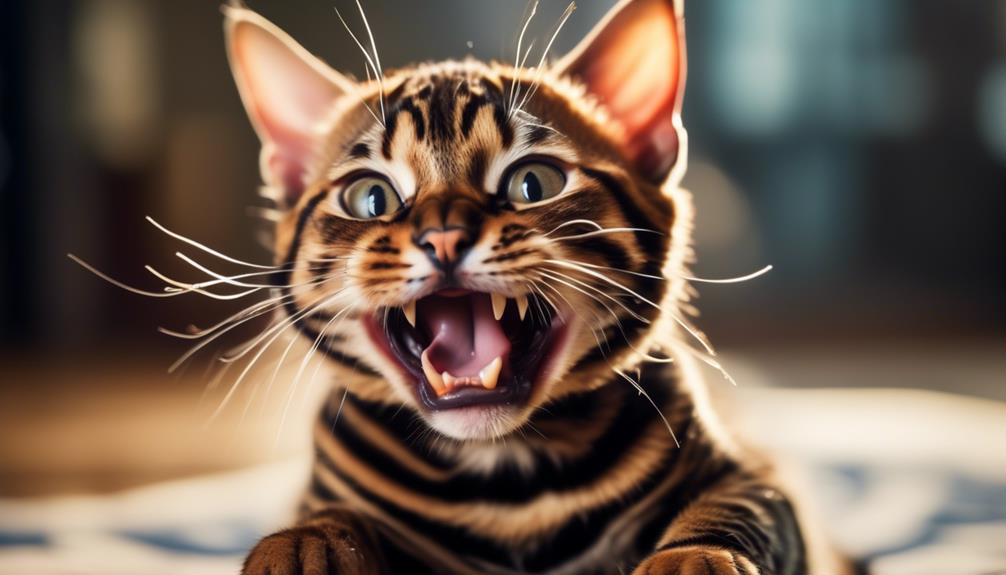
Toyger cats are known to have vocalization tendencies, and they can be pretty talkative.
They use a range of vocalizations to communicate with their owners and express their needs and desires.
Some Toygers may have a soft and gentle voice, while others may have a more assertive and demanding tone.
These vocalization tendencies are a natural part of the Toyger’s personality and should be expected by potential owners.
Understanding that each cat is unique and may have different vocalization patterns is essential.
Toygers may use vocalizations to seek attention, express hunger, or communicate discomfort.
By paying attention to their vocal cues and responding appropriately, owners can build a strong bond with their Toyger and ensure their needs are met.
Health and Care
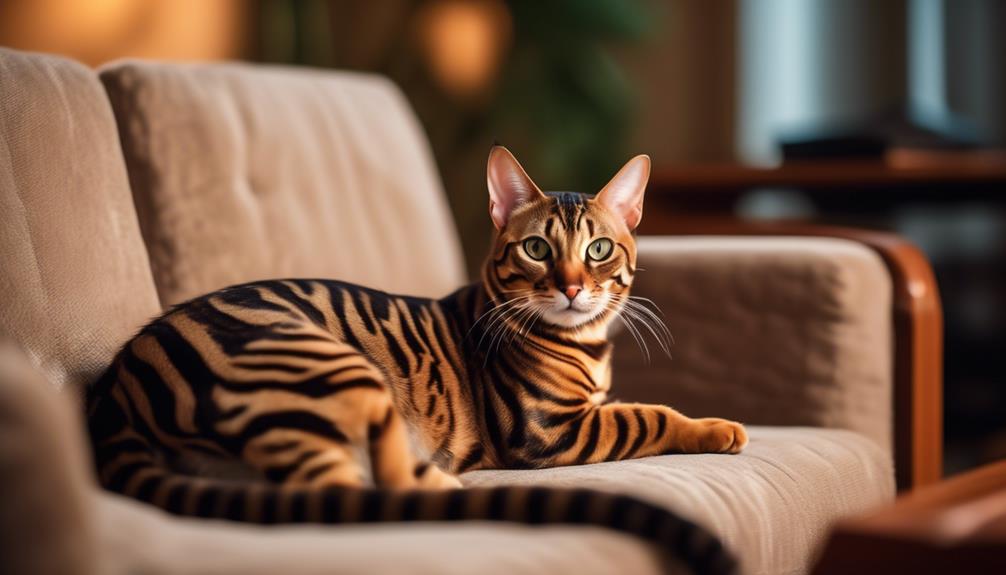
Toygers require regular veterinary care and a balanced diet to maintain their health and well-being.
They are generally considered healthy cats but may be predisposed to obesity, so it is important to provide them with a balanced diet and regular exercise.
Regular wellness visits with a vet are essential for monitoring their health and addressing any potential issues.
Toygers should also be stimulated physically and mentally to prevent boredom and destructive behaviors.
Providing them with a cat tree or furniture for climbing, as well as interactive smart toys for mental stimulation, is recommended. Outdoor sessions should be supervised using a safe leash and harness.
Regular grooming, such as nail trimming, ear cleaning, and teeth brushing, should also be implemented.
Toygers are adaptable to most climates, but it is important to provide them with shade and fresh water to ensure their comfort.
Grooming and Exercise
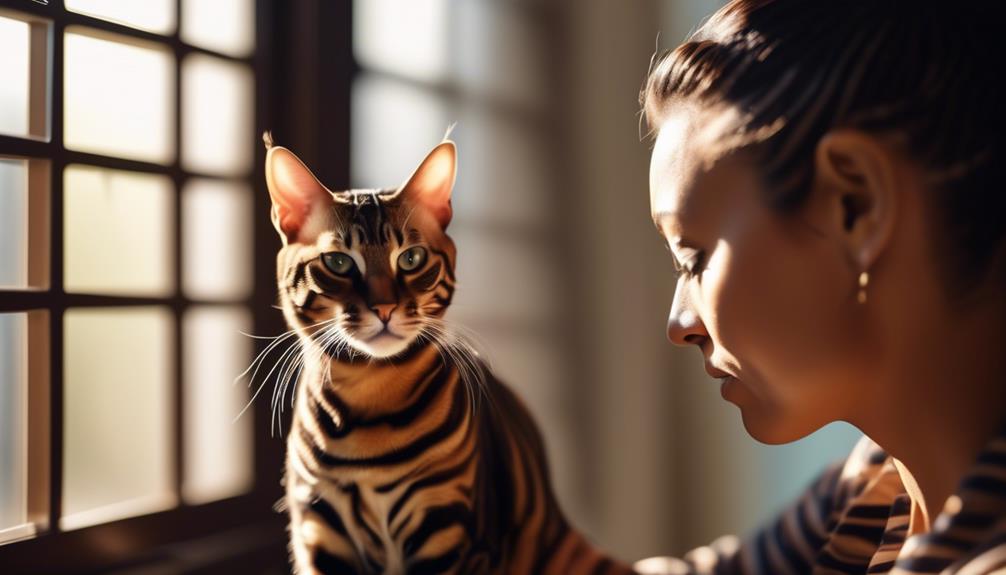
Regular grooming and exercise are essential for maintaining the health and well-being of Toyger cats.
To ensure their optimal care, consider the following:
Grooming:
- Brush their short, dense coat once a week to remove loose hair and prevent matting.
- Trim their nails regularly to avoid overgrowth and discomfort.
- Clean their ears regularly to prevent wax buildup and infections.
Exercise:
- Provide physical and mental stimulation through interactive play sessions, such as chasing toys or using puzzle toys.
- Set up a cat tree or furniture for climbing and exploring.
- Supervise outdoor sessions with a safe leash and harness to prevent accidents and keep them safe.
Adapting to Climates
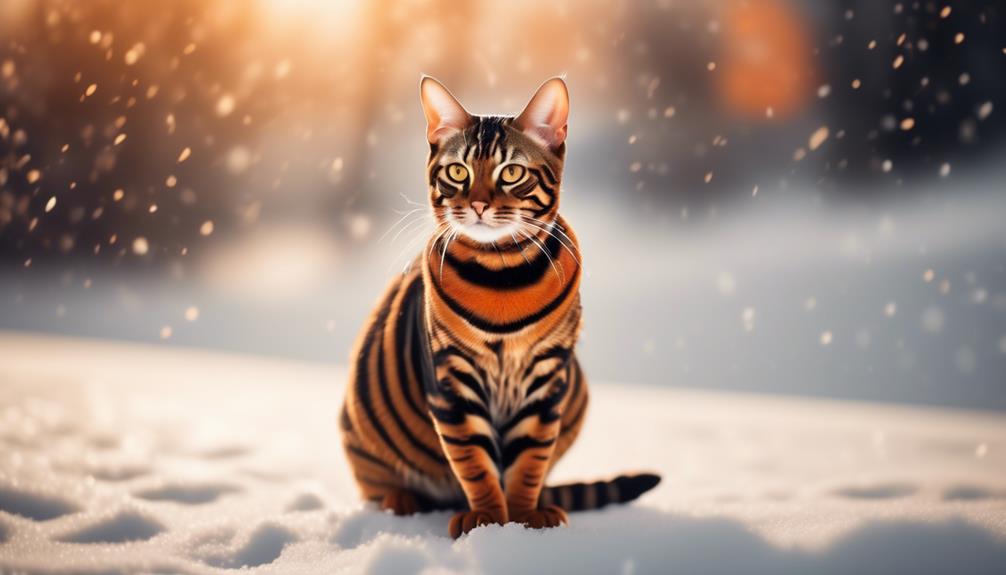
As a breed, Toyger cats are known for their adaptability to various climates.
Whether hot and humid or cold and snowy, Toygers can adjust and thrive in different weather conditions.
Their short, dense coat provides insulation and protection, making them suitable for warm and cold climates.
However, providing them with shade and fresh water during hot weather is important to prevent overheating.
They may appreciate a cozy indoor environment or access to a heated area in colder climates.
Toygers are generally hardy cats and can adapt well if their basic needs are met.
Whether it’s a tropical paradise or a winter wonderland, Toygers can stay home in any climate.
Toyger Adoption and Ethics
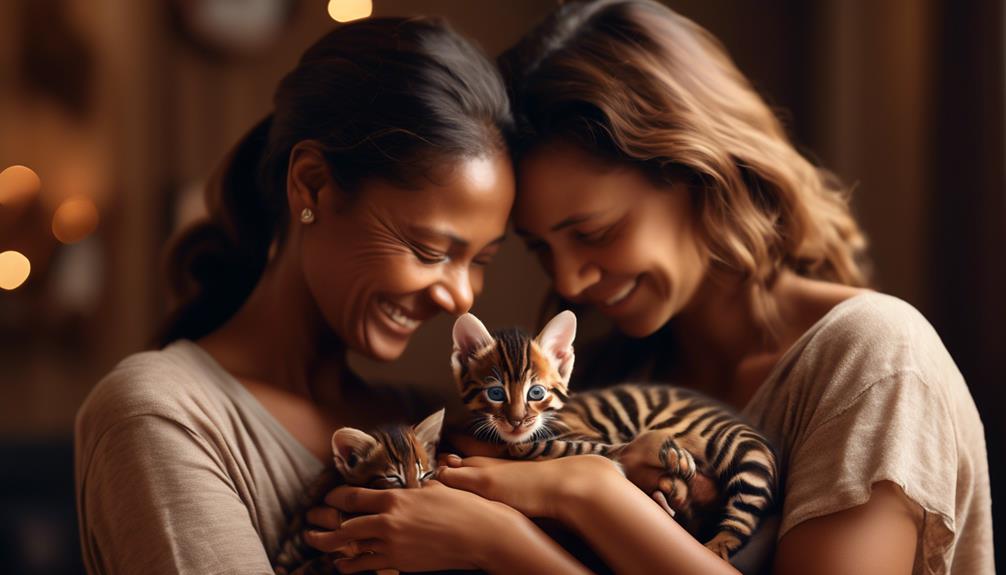
When considering the adoption of a Toyger cat, it is essential to prioritize ethical practices and responsible sources.
Here are some important points to consider:
- Adopt from rescue organizations or shelters: By adopting from these sources, you are giving a loving home to a cat in need and supporting the efforts to reduce the number of homeless animals.
- Choose a reputable breeder if purchasing a Toyger kitten: If you decide to buy a Toyger from a breeder, thoroughly research their ethical practices. Reputable breeders prioritize the health and temperament of their cats and follow responsible breeding practices.
- Support breeders who contribute to tiger conservation: Some Toyger breeders donate a portion of their profits to tiger conservation efforts, helping to protect these magnificent creatures in the wild.
Frequently Asked Questions
Are Toyger Cats Aggressive or Prone to Biting?
Toyger cats are not typically aggressive or prone to biting. They have an affectionate and loving nature, thrive in a busy household, and enjoy human company.
Early socialization and setting boundaries are important for their development.
Can Toyger Cats Be Trained to Walk on a Leash?
Yes, Toyger cats can be trained to walk on a leash.
With patience, positive reinforcement, and gradual introduction, Toygers can learn to walk on a leash and enjoy outdoor adventures while being safe and supervised.
How Do Toyger Cats Interact With Children?
Toyger cats interact well with children due to their affectionate and loving nature.
They form strong bonds, enjoy playing games, and thrive in a busy household.
Early socialization and setting boundaries are important for a harmonious relationship.
Are Toyger Cats Hypoallergenic?
Toyger cats are not considered hypoallergenic.
While they may produce less of the allergenic protein Fel d 1 compared to other cat breeds, individuals with allergies should still proceed cautiously and spend time with a Toyger to assess their reaction.
Do Toyger Cats Require a Special Diet or Feeding Routine?
Toyger cats do not require a special diet or feeding routine.
However, they are predisposed to obesity and should be given a balanced diet and regular exercise to maintain a healthy weight.
Conclusion
In conclusion, the Toyger cat breed is a unique and charming addition to any household.
With their distinctive appearance resembling a tiger and their affectionate and playful personality, Toygers make great companions.
While they may be prone to obesity, a balanced diet and regular exercise can help maintain their health.
Regular wellness visits with a veterinarian are crucial for their well-being.
Overall, the Toyger is a delightful breed that brings joy and happiness to their families.




